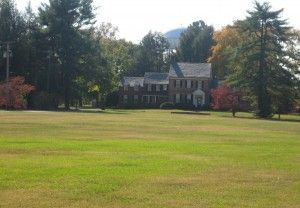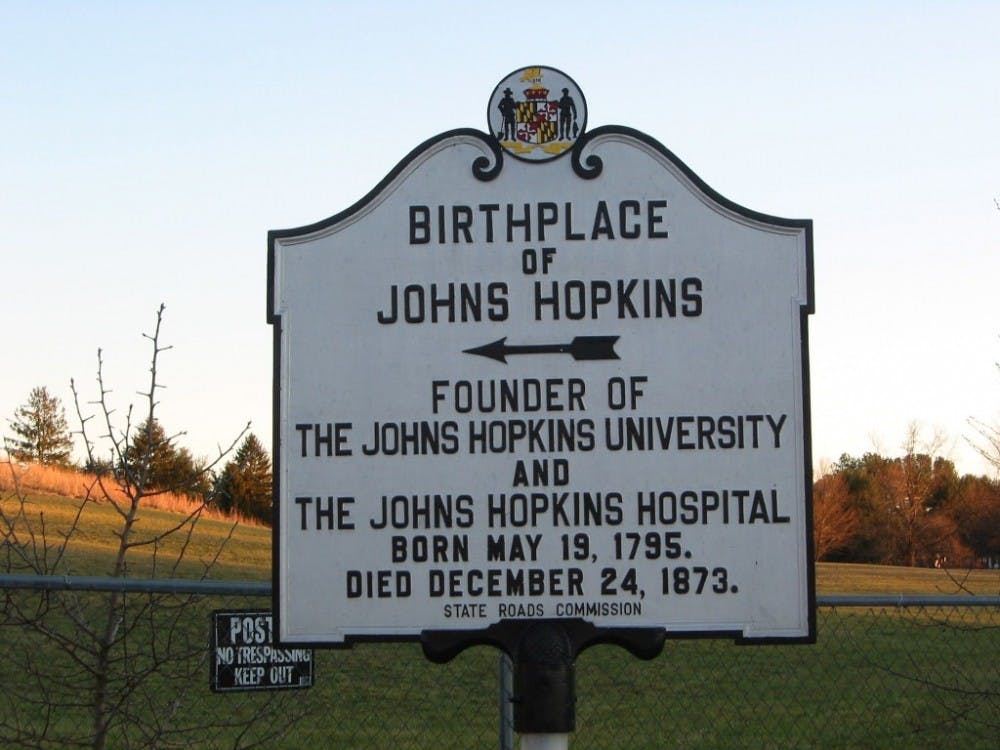The birthplace of University founder Johns Hopkins is facing the threat of demolition if a new owner is not found. The two-story home is known as Whites Hall and is located about 20 miles outside of Baltimore.
In January, property developer Polm Companies, the current owner of Whites Hall, filed for a permit to demolish the home located in Crofton, Maryland. It currently stands empty with the windows boarded up to prevent vandalism. Built over two hundred years ago, it sits on Johns Hopkins Road next to a golf course and new home development. Only 13 of the original 1,800 acres of the estate remain part of the property as the population and the amount of development in the county continues to surge.
Although Whites Hall is listed on the Inventory of Historic Properties by the Maryland Historical Trust, its owner is not required to maintain it or protect it from demolition. Whites Hall was purchased by Polm Companies for $2.5 million in 2005. Before that, the privately-owned property was used to raise Black Angus cattle by a small business owner, Stephen Duckett, who died in 2002.
Polm Companies is the developer of new, half-a-million dollar family homes that will be nearby. There are plans by a different developer to construct an assisted-living facility named Spring Arbor next door to the home.
Many members of the local community have voiced their opposition to the proposed demolition of Whites Hall. They hope to discuss other options for the building with Polm Companies.
The local government will not purchase the house because of the restoration costs, so community members hope that a new buyer will submit an offer.
The Greater Crofton Council, an association of homeowners in the area, is concerned with the current owner’s treatment of Whites Hall, according to its vice president Torrence Jacobson. He says that community members are firmly against the demolition of the historic property and that some have even offered to purchase the property, but Polm Companies has not responded to any of their offers.
“Lots of people are concerned, and most people don’t want the house to be knocked down,” Jacobsen said. “We’ve had people talk to the owner of the property about purchasing it, and nothing has been dealt yet. We’re expecting someone to purchase it, maybe the alumni or the University itself.”
However, Sarah Aaron of Polm Companies said that the developer is putting the property up for sale at $750,000, although it is currently not listed. The company heard the community’s complaints in local newspapers, but no one has stepped forward with an offer, according to Aaron.
If the property is demolished by Polm Companies, it is unlikely that anything new will be constructed in its place. Jacobsen said that Polm Companies has used all of the housing units it is allowed to build in the area, per the county’s zoning regulations. Thus, Jacobsen says that Polm Companies’ best option would be to sell the property for its own interest and that of the community.

According to Jacobsen, Polm Companies has not been forthcoming to the public about selling the house.
“The house can’t be for sale if it’s not listed,” he said. “We’ve had people talk to them, and they have not come into terms with any other buyers. But he [Richard Polm, president and CEO] can’t develop this property. He already has used all of his allocations for building. It doesn’t make sense why he has to do this.”
On the other hand, Aaron insists that the demolition permit is a “fail-safe” option.
“The property is in a lot of disrepair, including when it was owned by Stephen Duckett. There have been break-ins, and we had one last week. It’s been graffitied, torn apart. And someone tried to start a fire. It is an increasing hazard,” she said.
While it is unclear if Polm Companies is currently in any deals with buyers willing to invest in the purchase and maintenance of the house, both Polm Companies and community members seems to agree that keeping Whites Hall intact is the best plan.
Aarons said that Polm Companies even attempted to file it as a national historic place, which would help the company secure grant money, but that they were not successful. She said Polm Companies has also reached out to University President Ronald J. Daniels and the Office of Facilities and Real Estate about buying the property, but that neither party expressed interest.
“We would rather sell it and see someone else do something about it. If someone else could take care of it that would be wonderful,” Aaron said.
Jacobsen believes that preservation is a viable option. He wants Hopkins to support the community’s efforts in saving it and is disappointed by the responses he has received so far.
“I’ve received a couple of emails from people who have sent emails to Alumni Association, Michael Bloomberg, the University itself and would they be interested in purchasing it. And we haven’t heard back from them. After it is restored, the house would obviously be worth the two million spent in buying and fixing it,” he said. “It’s not a whole lot of money in today’s world.”
“If we allow this house to be demolished, it says that we don’t really think he’s important.” — Sophomore Lily Kairis
Currently, Johns Hopkins Sheridan Libraries & University Museums has two other historic properties in its care, Homewood and Evergreen, and it will likely not take responsibility for a third.
“The Whites Hall property, as important historically as it is, is not and has never been a part of the University,” Dennis O’Shea, executive director for Media Relations and Crisis Communications, said.
The last assessment of the property by the Maryland Historical Trust noted that the house was in good condition and that few examples of a house with Georgian architecture exist in the area today. Meanwhile, growing housing and commercial development continues to threaten the historic, rural setting.
Anne Arundel County, in which White Halls is located, is likely to grant the permit only if it believes that it is in an irreversible state of disrepair.
According to Jacobsen, Polm Companies promised that it would preserve the house when it first purchased the home, but that it has not done so. Jacobsen thinks that the company is delaying its sale of the house until it falls on its own.
“The house still has great bones and still can be preserved. Somebody should be stepping forward to purchase the home,” he said. “It’s just a really rich developer doesn’t want to do it himself. In the past he told us that he would maintain the home, but he hasn’t. We know of at least two past offers have been sent to him and he has not answered them.”
Karen Hansen, Class of 1981, an emergency room doctor at University of Maryland who lives near the house, feels that the University or the Hopkins alumni community should take more action to save Whites Hall. She believes that the University can put it to good use in the future such as hosting visiting faculty or to hold receptions and weddings.
“The thing is that Evergreen [Museum & Library] is huge. This is not a huge property; This is not a huge amount of money. Jacobsen said he could purchase this property for $600,000. They estimate that it could be renovated for $1.2 million. Those costs could be deferred to renting it out and using it for functions that could be used to bring money to the University,” Hansen said.
Sharon Ascherl, a local resident for 35 years, said that she cannot think of another house like Whites Hall in the area. She couldn’t imagine why the hospital or University, which have given Johns Hopkins his worldwide name recognition, aren’t more interested in saving the place where he grew up.
“It has some of our history around here and having it torn away and having housing tracts put up, there will be nothing left of our history. This place used to be all tobacco farms. I can remember it, and it used to be very pretty. There are now townhouses and progress; That’s fine, but we need a little bit of our history,” she said.
While the local community cherishes Whites Hall as an important part of local history in Anne Arundel County, students at Hopkins are divided about how the University should react. Many were not aware about where Hopkins’ birthplace even was. Some said that Hopkins is not famous enough or that he has received enough recognition.
“I don’t really think the University has to take a stance on it. His legacy kind of stands without the house. It has no significance I think to the student body,” senior Kenny DeStefano said.
Many wondered what developer wants to do with the land instead.
“Why are they so not transparent? If I knew what they wanted to do with it, I would have a better opinion about it,” junior Ji Young Ahn said.
Still others believe that the University letting the Johns Hopkins birthplace be demolished lessens the importance of his life’s work. Sophomore Lily Kairis said that the student body as a whole don’t know as much as they should about Johns Hopkins, the person.
“Going to this school, it’s hard to remember that this University is named after a man who had an education and life. I don’t know much about Johns Hopkins, but I’ve benefited so much from the efforts of his life,” she said. “Like Edgar Allen Poe’s house, nobody wants to demolish it, too. Because no one wants to demolish their homes, it says that these are people who we need to remember. If we allow this house to be demolished, it says that we don’t really think he’s important.”
Hansen, who has lived near the house for nearly 14 years and drives by the house on her way to work, says that she can’t imagine why demolition would be the only option for the house. However, she acknowledged that the area is experiencing an influx of new construction.
Whites Hall is one of the few houses remaining in an area that was first settled in the 1700s, before the nation’s founding.
Regardless of whether the University supports offers support, the community says it will not let the house go without a fight.
“Just discovering that there’s a possibility that the house will be destroyed was disturbing to me and the fact the University has no interest in it makes no sense given the relatively low cost,” Hansen said.
Correction: Karen Hansen, Class of 1981, was mistakenly referred to as Kristen Hansen, Class of 1989. Additionally, Polm Companies was mistakenly referred to as the developer of the Spring Arbor project.





